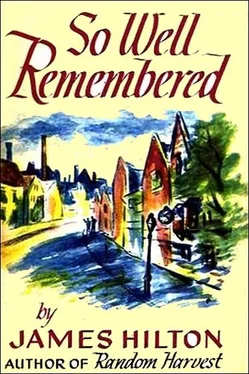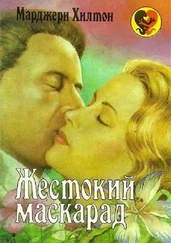Джеймс Хилтон - So Well Remembered
Здесь есть возможность читать онлайн «Джеймс Хилтон - So Well Remembered» весь текст электронной книги совершенно бесплатно (целиком полную версию без сокращений). В некоторых случаях можно слушать аудио, скачать через торрент в формате fb2 и присутствует краткое содержание. Год выпуска: 1945, Жанр: Проза, на английском языке. Описание произведения, (предисловие) а так же отзывы посетителей доступны на портале библиотеки ЛибКат.
- Название:So Well Remembered
- Автор:
- Жанр:
- Год:1945
- ISBN:нет данных
- Рейтинг книги:5 / 5. Голосов: 1
-
Избранное:Добавить в избранное
- Отзывы:
-
Ваша оценка:
- 100
- 1
- 2
- 3
- 4
- 5
So Well Remembered: краткое содержание, описание и аннотация
Предлагаем к чтению аннотацию, описание, краткое содержание или предисловие (зависит от того, что написал сам автор книги «So Well Remembered»). Если вы не нашли необходимую информацию о книге — напишите в комментариях, мы постараемся отыскать её.
So Well Remembered — читать онлайн бесплатно полную книгу (весь текст) целиком
Ниже представлен текст книги, разбитый по страницам. Система сохранения места последней прочитанной страницы, позволяет с удобством читать онлайн бесплатно книгу «So Well Remembered», без необходимости каждый раз заново искать на чём Вы остановились. Поставьте закладку, и сможете в любой момент перейти на страницу, на которой закончили чтение.
Интервал:
Закладка:
“So are you, aren’t you?”
George smiled. “I was one of six kids brought up in four rooms. Not a bad way to become a PRACTICAL authority.”
“I should think it was also a pretty good education for your father.”
“Well, no—because he wasn’t interested in earthly houses so much as in heavenly mansions.” George chuckled.
“A good thing his son didn’t take after him, then. I hear you’ve done rather well for that town of yours.”
“Not so badly. I reckon Browdley’s five per cent better than it might have been if I’d never been born.”
“That’s modest of you.”
“Nay, I’d call it swelled head. Takes a lot for one man by himself to make five per cent of difference to anything.”
“Same in flying. The idea of the lone hero soaring into the blue on a mission of his own is a bit outmoded.”
“Aye, it’s all team-work nowadays.” George added hastily: “Not that I’m much of an expert on military affairs.”
“Is anybody? What about all the so-called experts who’ve been wrong? About the Maginot Line, for instance?”
George sighed. “I was wrong about that too, without being an expert.”
“I suppose you were fooled by the last war—superiority of defence over attack, and so on?”
“To some extent. I couldn’t help remembering the Somme.”
“You were there?”
“Er… yes.”
“What were you in—the poor bloody infantry?”
“No.”
“Artillery? Sappers?”
“No… I… er… I wasn’t in the armed forces at all.”
“War correspondent? You’re still in the newspaper business, aren’t you?”
“I was—in a small way—until recently.”
Charles laughed. “I WON’T be fobbed off with a mystery! What WERE you in the last war, for God’s sake?”
George then answered the question that he had not been asked for a long time, and which he never went out of his way to encounter, but which, when it was put directly, he always answered with equal directness. “I was a conscientious objector,” he said.
There was a little silence for a moment—not an awkward one, but a necessary measuring-point in the progress of an intimacy. And this was the moment that made George sure he was liked and not merely tolerated by the youth whose less injured hand moved slowly across the arm of the wheelchair towards him.
“Conchy in the last war, eh?” The hand reached out. “Shake, then. Because that’s what I might be in the next—if they have a next.”
George took the wrinkled burned-red hand, though he thought it an ironic occasion to have first done so. Presently Charles went on: “What happened? You had a bad time?”
“Well,” answered George, a little dazed at the extent to which they were talking as if they had known each other all their lives, “I was on the Somme, as I said, and THAT was a pretty bad time. My brother—one of my brothers—and I—were in the same Ambulance Unit. He was killed.”
“Driving an ambulance?”
“No. We were both stretcher-bearers.”
“Not exactly the safest job on earth.”
“No.”
“But you came through all right?”
“I was gassed—not very badly, but it led to pneumonia and a medical discharge. Probably saved my life in the long run.”
Charles said, with a touch of pathos: “What did it feel like—after that? When you were out of hospital, I mean, but still not well enough to do things normally? How did you get used to things again?”
“I didn’t, because the things I’d been used to before the war were things I didn’t intend to get used to again—ever… But of course in your case it’s different.”
“I don’t know that it is, particularly… But tell me about how you got started again. In business, wasn’t it? A newspaper?”
“Aye, but it sounds too important when you put it that way. Just a bankrupt small-town weekly. Nobody’s bargain, they practically threw it at me, but I thought it would help me in local politics.”
“And it did?”
George nodded. “I was lucky. One of those handy by-elections cropped up, and there I was—the youngest town councillor Browdley had ever had.”
“How old were you then?”
“Let me see… it was April ‘seventeen when they let me out of hospital, and the election was in the September following. I’d be thirty-one.”
“You didn’t lose any time.” Charles thought for a moment, then added: “Wasn’t it against you to have been a conscientious objector?”
“Quite a bit. The other side used it for all they were worth, but Browdley’s got a mind of its own in local matters even in war- time.” George chuckled. “I was for lowering the fares on municipal buses before eight in the morning. That got all the factory workers.”
Charles smiled. “You weren’t a pacifist in the election, then?”
“I was if anybody asked me, but I used most of my eloquence on the bus fares.”
“The war must have been on your mind, though.”
“Aye, it was—just as it still is.”
After another pause Charles said thoughtfully: “So you think it’s wrong to take human life under any circumstances?”
“I did then.”
“You mean you don’t think so any more?”
“That’s about it. I’m not so sure of a lot of things as I was in those days. I don’t hate war any less, but the problem doesn’t look so simple for an individual to make up his mind about. Seems to me there are times when life’s less important than a few other things, and those are the times when taking it—and giving it—are the only things we can do. It’s the price we have to pay if we can’t get what we want any cheaper.”
“And what IS it that we want?”
“I don’t know what YOU want, but if I had a boy I’d want a better world for him than either your generation or mine has had.”
“A world fit for heroes to live in, eh?”
“Nay, I’d rather call it a world fit for ordinary folks to be heroic in… And I can’t see it coming unless we win this war. I don’t see it necessarily coming even if we DO win it… But there’s a CHANCE if we do.”
“Quite a change in your attitude from last time.”
“Aye—but that doesn’t mean I regret what I did then. Seems to me I was right for a reason I couldn’t have foreseen. Doesn’t what’s happening now prove it? What good did that first war do—all the misery and butchery I saw on the Somme? What was it for? To save freedom? There was less in the world afterwards. To crush Germany? Germany was strong again within a generation. To fix Europe once and for all? Europe got unfixed again worse than ever…”
“I’ll tell you one thing it did, Mr. Boswell—it gave some of you chaps who survived it twenty years of a damned good time. It gave you twenty years of movies and dog-racing and charabanc-outings and stock-market gambles and holidays on the Continent and comfortable living—twenty years of the kind of fun WE may not have, even if we DO survive.”
George answered: “ I didn’t have twenty years of fun. I had twenty years of trying to improve a little town called Browdley—trying to put up a few schools and pull down a few slums—trying to make some headway against the greed and selfishness of those old Victorian shysters who ran the place for half a century like a slave-barracks…”
“And what does that prove? Merely that we all get saddled with old debts. You had the Victorian mess to deal with—I’ve got yours.”
“MINE?”
“Who else’s? You surely don’t claim that you used those twenty years successfully? The last war mightn’t have been so worthless unless you’d made it so…” Charles added, smiling: “Not that I mean anything personal, of course. You risked your life, same as I have, and then you came home and did what seemed to you worth doing. But it WASN’T worth doing—because the main thing wasn’t right. And the main thing was the peace. Why weren’t you a conscientious objector to THAT?”
Читать дальшеИнтервал:
Закладка:
Похожие книги на «So Well Remembered»
Представляем Вашему вниманию похожие книги на «So Well Remembered» списком для выбора. Мы отобрали схожую по названию и смыслу литературу в надежде предоставить читателям больше вариантов отыскать новые, интересные, ещё непрочитанные произведения.
Обсуждение, отзывы о книге «So Well Remembered» и просто собственные мнения читателей. Оставьте ваши комментарии, напишите, что Вы думаете о произведении, его смысле или главных героях. Укажите что конкретно понравилось, а что нет, и почему Вы так считаете.










